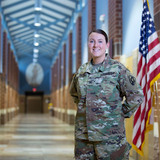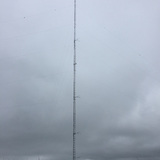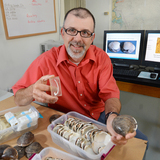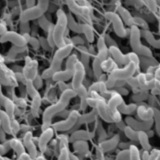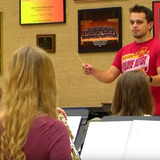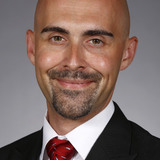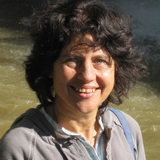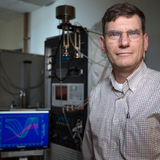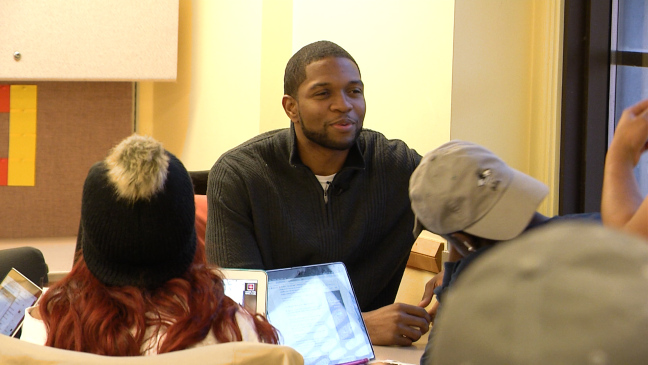News Archive
Friday, December 9 2016
-
Service, school define success for Iowa State graduate
Christie Smith made a commitment to serve her country when she was just 17 years old. It was a decision strongly influenced by a family history of military service that dates back to the Civil War. While it's taken Smith longer than most to earn her degree, she wouldn't trade her military experience for anything -- it's what ultimately brought her to Iowa State.
-
Wind turbines may have beneficial effects for crops, according to Iowa State University research
Turbulence created by wind turbines may help corn and soybeans by influencing variables such as temperature and carbon dioxide concentration, according to Iowa State University research. The project drew on data generated by research towers set up on a 200-turbine wind farm in Iowa.
-
Iowa State researcher joins effort to prevent online harassment
The prevalence of online harassment is well documented. In the U.S. alone, approximately 140 million people were affected by online harassment, according to a 2014 Pew Research Center study. That’s why Rey Junco, an associate professor in ISU’s School of Education, is part of a team of researchers working with Google Jigsaw to understand why people engage in online harassment, the personal and social costs and how best to intervene and prevent it from happening.
-
Iowa State University design faculty member brings mother's Holocaust story to school stages
Deborah Pappenheimer's book, “My Broken Doll: A memoir of survival of the Vichy Regime,” is the story of her mother, who was relocated nearly 20 times before the age of 15 as a hidden Jewish child during World War II. The book has been adapted for the stage and will be performed in a dozen schools across Nebraska, and at the Nebraska High School Thespian Convention in Lincoln in January. Pappenheimer is a senior lecturer in the College of Design.
-
Iowa State scientist uses clam shells to help build 1,000-year record of ocean climate
Just like trees have growth rings that scientists can study for clues about past growing conditions, clam shells have growth increments that offer clues about past ocean conditions. Scientists -- including Iowa State's Alan Wanamaker -- have sorted and studied thousands of clam shells to build a 1,000-year record of ocean conditions at a spot just off North Iceland. That record tells scientists that ocean variability played an active role in driving the major climate changes before the industrial revolution. But that changed with industrialization. The scientists' findings were just published online by the journal Nature Communications.
-
Dec. 9 Yiannopoulos event canceled
Organizers of the Milo Yiannopoulos event scheduled for Friday, Dec. 9, have canceled his appearance following a meeting with ISU's Memorial Union, police and risk management staff. Organizers expressed concern about the ability to fund necessary event security by Friday. University officials offered to reschedule the event to allow the group more time to secure funding. The group declined, citing Yiannopoulos' future availability.
-
Iowa State University researchers detail what makes costly ruminant bacteria so infectious
An Iowa State University veterinary research team has discovered the specific genetic mutations that make Campylobacter jejuni such a virulent strain of bacteria in ruminant animals such as sheep and cattle. The research could lead to a vaccine or new ways to control the bacteria.
-
Teaching students to lead without saying a word
Whether it’s directing a high school pep band or a world-class orchestra, it's up to the conductor to lead and set the tone for a piece, all without uttering a word. There are proper gestures and cues to master, but Jacob Harrison doesn't want his students to get so caught up in technique that they forget to take risks with the music.
-
Gene mutation linked to early onset of Parkinson’s disease in Caucasians
A defect in a gene that produces dopamine in the brain appears to accelerate the onset of Parkinson’s disease, according to new research from Iowa State University. The effect is particularly dramatic for young-to-middle-age adults.
-
Iowa State University scientists explore environmental advantages of horticultural bioplastics
Bioplastic may offer gardeners a more sustainable alternative to petroleum-based pots and flats, according to Iowa State University research. Although more expensive to manufacture than conventional plastics, bioplastics someday may grow beyond a niche market, said ISU experts.
-
AAAS honors six Iowa State researchers for distinguished work advancing science
The American Association for the Advancement of Science (AAAS) is honoring six Iowa State University researchers for their distinguished work advancing science or its applications. The researchers are part of this year's class of 391 AAAS fellows.
-
ISU scientist receives NSF grant to study origins and functions of orphan genes in corn and other crops
An ISU scientist is leading an effort to study orphan genes in crop species. The research, supported by a National Science Foundation grant, could lead to breeding and engineering crop varieties that better meet the nutritional needs of humans and are more resistant to stress.
-
ISU researchers want to break down language barriers with math and text messages
Getting parents engaged in their child’s classroom isn’t easy when mom and dad don’t speak English. That’s why two researchers in Iowa State University’s School of Education are working to overcome language barriers with text messages that kindergarten teachers can send home to parents.
-
Iowa State engineers study glass in batteries as a way to increase performance and safety
Iowa State University's Steve Martin has researched battery materials for 30-plus years. He has a new grant that will allow him to expand his fundamental materials studies into research and development of new, all-solid-state technology for actual batteries. He calls it a "dream-come-true" project.
